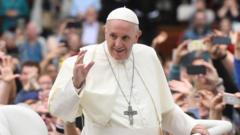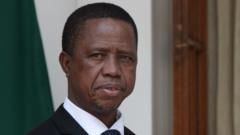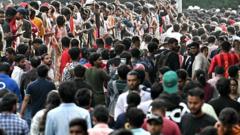With tributes pouring in from world leaders, the Catholic Church now prepares for a new chapter following his influential papacy.
Pope Francis Dies at Age 88, Marking End of a Historic Papacy

Pope Francis Dies at Age 88, Marking End of a Historic Papacy
The Vatican announces the passing of the first Latin American Pope, leaving a legacy of compassion and reform.
Pope Francis, born Jorge Mario Bergoglio in Argentina, has died at the age of 88, the Vatican confirmed today. In a statement released via Telegram, Cardinal Kevin Farrell noted, “This morning at 07:35 local time (05:35 GMT) the Bishop of Rome, Francis, returned to the home of the Father.” His death comes shortly after he made a public appearance during Easter Sunday, greeting countless worshippers in St Peter's Square.
Having recently emerged from a five-week hospitalization for an infection that caused double pneumonia, Francis's health had been a concern in recent months. Tributes from across the globe have begun to surface. The Archbishop of York, acting head of the Church of England, referred to him as a "holy man of God," emphasizing his grounded humanity. U.S. Vice-President JD Vance expressed his heartfelt condolences after meeting the Pope just days before his passing.
French President Emmanuel Macron remarked on the pope's unwavering commitment to the vulnerable, while Dutch Prime Minister Dick Schoof extolled Francis's role as a "man of the people.” The Pope's last public appearance on Easter Sunday featured him waving from his wheelchair to throngs of admirers, wishing them well with the words, "Dear brothers and sisters, happy Easter."
He conveyed a poignant Easter message, emphasizing the necessity of religious and personal freedoms in achieving peace and reflecting on the pervasive violence found in ongoing global conflicts.
Following the death of Pope Francis, governance of the Catholic Church will temporarily transition to the College of Cardinals until a new pope is elected. Currently, there are 252 Catholic cardinals, with 138 eligible to cast votes in the upcoming conclave.
Pope Francis's papacy was notable for its series of reforms and historic firsts, including being the first non-European Pope in over a millennium. He was also the first Jesuit elected to the papal throne, a fact that historically drew skepticism from within the Vatican. His legacy continues to influence the Church and its followers globally.
Having recently emerged from a five-week hospitalization for an infection that caused double pneumonia, Francis's health had been a concern in recent months. Tributes from across the globe have begun to surface. The Archbishop of York, acting head of the Church of England, referred to him as a "holy man of God," emphasizing his grounded humanity. U.S. Vice-President JD Vance expressed his heartfelt condolences after meeting the Pope just days before his passing.
French President Emmanuel Macron remarked on the pope's unwavering commitment to the vulnerable, while Dutch Prime Minister Dick Schoof extolled Francis's role as a "man of the people.” The Pope's last public appearance on Easter Sunday featured him waving from his wheelchair to throngs of admirers, wishing them well with the words, "Dear brothers and sisters, happy Easter."
He conveyed a poignant Easter message, emphasizing the necessity of religious and personal freedoms in achieving peace and reflecting on the pervasive violence found in ongoing global conflicts.
Following the death of Pope Francis, governance of the Catholic Church will temporarily transition to the College of Cardinals until a new pope is elected. Currently, there are 252 Catholic cardinals, with 138 eligible to cast votes in the upcoming conclave.
Pope Francis's papacy was notable for its series of reforms and historic firsts, including being the first non-European Pope in over a millennium. He was also the first Jesuit elected to the papal throne, a fact that historically drew skepticism from within the Vatican. His legacy continues to influence the Church and its followers globally.





















